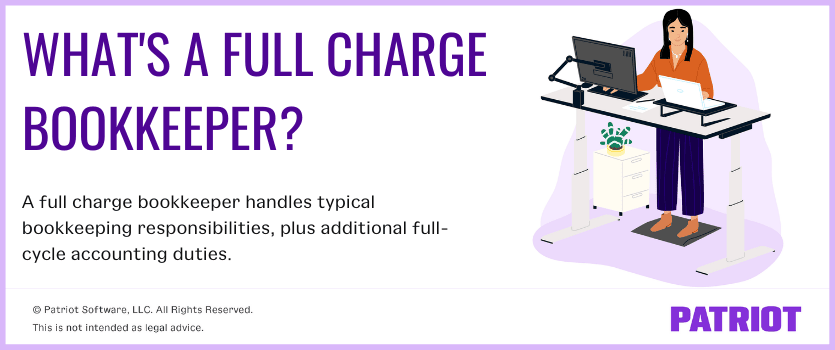Ready to move beyond bookkeeping into a slightly more complex role? If so, you might consider full charge bookkeeping. But, what exactly does a full charge bookkeeper do?
In this article, we’ll cover everything you need to know about full charge bookkeeping, including:
- What is full charge bookkeeping?
- How to become a full charge bookkeeper
- Full charge bookkeeper salary
What is full charge bookkeeping?
A full charge bookkeeper handles typical bookkeeping responsibilities (e.g., data entry), plus additional accounting duties. Think of full charge bookkeeping as a mix between traditional bookkeeping and accounting. You must handle day-to-day bookkeeping tasks along with full-cycle accounting duties.

So, what kind of responsibilities are associated with this career? Full charge bookkeeping services include:
- Recording transactions
- Handling accounts payable
- Billing the business’s customers
- Preparing bank deposits
- Helping prepare financial statements (e.g., income statement)
- Helping prepare tax returns
- Running payroll for the business
- Supervising other administrative employees (if in-house)
- Coordinating tasks with CPAs
Generally, small- and medium-sized businesses that do not have a controller use full charge bookkeepers. In this role, you can either work for a business in-house (e.g., 40-hour+ workweeks) or take on clients (e.g., outsourced).
The bottom line: Full charge bookkeepers handle all of a business’s accounts and accounting responsibilities.
Full charge bookkeeper vs. accountant
You might be wondering, What’s the difference between a full charge bookkeeper and accountant?
To answer this oh-so-important question, let’s take a step back and compare bookkeeping and accounting:
- Bookkeeping is the record-keeping process of tracking finances.
- Accounting is the process of compiling account information and analyzing it.
But because full charge bookkeepers go beyond the typical responsibilities bookkeepers have, you may be confused about the difference between them and accountants.
Although full charge bookkeepers are responsible for a business’s accounting, they are not accountants or Certified Public Accountants. In this role, you may help prepare financial statements and tax returns for your employer, who then submits them to a CPA for review or auditing.
Also, unlike accountants, full charge bookkeepers generally do not provide tax planning advice or act as financial advisors.
How to become a full charge bookkeeper
Becoming a full charge bookkeeper is similar to becoming a bookkeeper. Generally, you need to have some or all of the following:
- High school diploma or equivalent
- Associate or bachelor’s degree
- Bookkeeping certifications (e.g., Certified Bookkeeping Professional license, Certified Bookkeeper)
- Experience in a bookkeeping role
- Accounting software experience
If you don’t have experience in full charge bookkeeping (or any bookkeeping experience), you may also need to undergo job training.
For success in this role, you should also have strong communication, organization, and attention to detail skills. You may also need supervisory experience.
Full charge bookkeeper salary
And now to the part you’ve been waiting for (or skimmed ahead to!): How much can you expect to earn as a full charge bookkeeper?
To give you an idea of how much professionals in this field make, you could take a look at the national hourly and salary averages:
- Average full charge bookkeeper hourly rate: $22.61 (according to Indeed)
- Average full charge bookkeeper salary: $45,570 (according to Salary.com)
Keep in mind that these are simply averages. Your earnings could differ based on factors like location, experience, education, certifications, the client’s size, and whether you work in-house.
For more specific salary information, consider researching average full charge bookkeeper salaries in your area.
This is not intended as legal advice; for more information, please click here.






